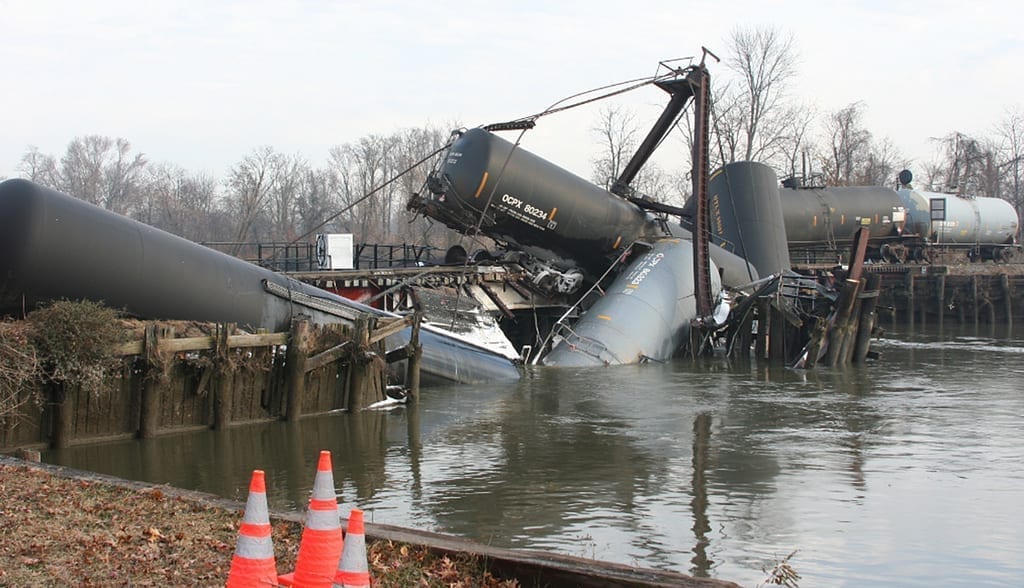Toxic Spills: The Cost is Much Too High

Toxic Spills: The Cost is Much Too High
As drillers (and veterans) reconverge at Standing Rock to build (and protest) the Dakota Access pipeline, toxic spills (and their costs) once again inspire public outcry. Native people rightfully worry about the integrity of their land and water. After all, on January 30th, another Enbridge pipeline burst in Texas (for the second time since it opened in 2016). This one spewed 600,000 gallons of crude; what will a similar spill do to the Missouri river? Pipelines fail, and it's not a matter of if but when. Leaky pipelines, train derailments, and other accidents endanger our water on a regular basis.A common point made in discussions regarding pipelines concerns their relative safety compared to other methods of transporting oil. Sure, we've all heard pipeline disaster stories, but aren't they safer than sending the oil by rail, truck, or ship? The same question relates to other toxic spills. Unfortunately, the many variables involved make choosing a clear favorite difficult. Buried pipelines lie untouched by weather, yet vulnerable to age, degradation, frost heave, erosion, and politically motivated inaccuracy in floodplain calculations. Regulations don't require many features that would enhance pipeline safety. Severe weather affects other forms of transport, but so do other problems like human error, infrastructure (dis)repair, and collisions.Train derailments that lead to toxic spills occur less frequently than tanker truck or pipeline incidents. When they do occur, though, the spills (on average) are bigger and potentially cause much more damage per incident. Pipelines are cheaper to use and consume less power than trucks or trains once they're established. However, the biggest pipeline failures dwarf the biggest rail failures. Pick your poison, I suppose, since (barring miracles) they all fail at some point or another. Tanker truck accidents risk public infrastructure shared with regular traffic. Trains topple off bridges, releasing toxic spills of chemicals and crude into rivers. Pipelines rupture undetected until some farmer checks his back forty and finds bubbling crude, and not in the funny Beverly Hillbillies way.Clearly, we can't trust the current administration to care overly much about public safety, either. Tapping Scott Pruitt (the Oklahoma attorney general who repeatedly sued the EPA) to lead the EPA, is a Trumpian smack in the face for every American who breathes air or drinks water. Conservatives have long wanted to reduce Americans' reliance on the government, and there's no better way than by picking unreliable leaders to take a hatchet to that trust. I wonder how that will go over in America's heartland, where toxic spills of corn ethanol have only risen in recent years.[embed]https://vimeo.com/201857647[/embed]Scott Pruitt Will Make America Great Again — for Polluters, from BillMoyers.comSpeaking of distrust, we can't even rely on the accuracy of reported statistics. A study of the National Response Center database, maintained by the US Coast Guard to keep track of the toxic spills in American waterways, found that the government routinely failed at updating the database with accurate information. Over 60% of the listed spills were said to have released no contaminants. Even if some of the spills were small, it's not really a spill if nothing came out, eh? Since the database lists a train incident that dumped chemicals into the Mississippi river for almost every single day in 2015, having so many zeroes is not helpful to people trying to figure out what's in their water. And when local residents experience health problems likely related to a nearby spill, it's hard to believe that nothing happened.Accepting toxic spills as the cost of modern life sacrifices the permanent at the altar of the temporary. The era of fossil fuels is by definition limited, even if the fracking boom supported a massive glut of natural gas production in recent years. Rolling back regulations on rail and pipeline transport guarantees more toxic spills and more long-term damage of our waterways, fish and wildlife, our farmland, our population centers, and of our health and the health of our children. This is why people traveled across the country and endure hardships to make a stand at Standing Rock. This is why they don't ask questions about safer ways to transport poisons so much as observe that it shouldn't be transported at all. And this is why corporate and government interests would like nothing more than to see the water protectors go away.
Sources:
US government fails to track toxic spills in nation’s waterways
Army veterans return to Standing Rock to form a human shield against police
Dakota Access Pipeline Approved a Week After Co-Owner's Pipeline Spilled 600,000 Gallons of Oil in Texas
Crude oil spills are bigger from trains than pipelines
Crude Oil Transport: Risks and Impacts (PDF)
As ethanol production grows, so do spills in Midwest
Rail Industry Eager for a New Trump Era Light on Safety Rules
The Train Derailment That Gushed Oil Into A Quebec River Has Spawned Freaky Fish

About Dawn Allen
Dawn Allen is a freelance writer and editor who is passionate about sustainability, political economy, gardening, traditional craftwork, and simple living. She and her husband are currently renovating a rural homestead in southeastern Michigan.
